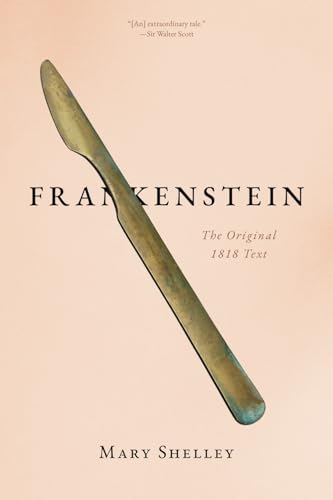Frankenstein
The Original 1818 Text
Mary Shelley
BOOK REVIEW

In the dark recesses of human ambition and the undeniable quest for knowledge lies Frankenstein: The Original 1818 Text, a work that transcends mere storytelling to explore the labyrinth of human emotion, ethics, and consequence. Mary Shelley, a beacon of Gothic literature, penned this haunting tale not merely as a horror story, but as a timeless meditation on the nature of creation and the responsibilities that stem from it.
The narrative follows Victor Frankenstein, a young scientist whose insatiable thirst for discovery leads him to breathe life into a grotesque creature assembled from dead body parts. Herein lies the crux of Shelley's exploration: the juxtaposition of ambition and moral accountability. In a world fixated on scientific advancement, can we ignore the humanity that lies within the very fabric of our ambitions? The monster, rejected by society and tormented by its creator, embodies our deepest fears of isolation and neglect, echoing the sentiments of countless individuals who have felt similarly ostracized.
Shelley's prose is a symphony of raw emotion, rendering Victor's hubris and the creature's profound loneliness with alarming clarity. 🖤 Reader reviews often emphasize the stark emotional landscape Shelley paints. One critic noted, "The visceral connection between creator and creation is spellbinding," while another lamented that "the depth of the creature's sorrow is more terrifying than any gruesome image." These reflections underline the emotional power of Shelley's writing-a power that induces both fear and compassion in equal measure.
Set against the backdrop of the Industrial Revolution, a time when humanity was both enthralled and terrified by scientific progress, Shelley's work serves as a cautionary tale about the ethical implications of unbridled ambition. Could this not parallel our current societal dilemmas regarding technology and bioethics? As we stand at the precipice of miraculous advancements in AI and genetic engineering, the questions that Shelley raised are not relics of the past but rather urgent inquiries relevant today.
As you delve deeper into this reimagined text, the parallels to current events become starkly vivid. The creature's relentless pursuit of acceptance mirrors the plight of those marginalized in contemporary society, challenging you to confront your biases and preconceptions. 🧠💔 As many readers have pointed out, Shelley's work compels you not to shy away from discomfort but to grapple with your own humanity.
While some critics argue that the pacing falters midway through, others proclaim it a deliberate mood-setting technique, a moment of reflection akin to the creature's own existential ponderings. Indeed, this push-pull dynamic within the narrative creates a profound sense of immersion-an emotional rollercoaster leaving you breathless with anticipation and dread.
Given its long-lasting influence, Frankenstein has ignited a myriad of adaptations and discussions, inspiring writers like H.G. Wells and filmmakers such as James Whale. It's not merely a text; it's a cultural touchstone sparking conversations about the ethics of creation that ripple through generations.
👹 As you close the final pages, the haunting question lingers: What does it mean to be human? Are we defined by our creations, or do we hold the power to redefine morality itself?
The allure of Frankenstein is undeniable; it is a breathtaking exploration of creation, destruction, and human fragility wrapped in a decadent cloak of Gothic horror. Whether you find yourself rooting for Victor or empathizing with the monster, one thing is for sure: Mary Shelley's masterwork will compel you to not only reflect but feel the weight of every choice made-both in life and literature. 🌌
📖 Frankenstein: The Original 1818 Text
✍ by Mary Shelley
🧾 196 pages
2022
#frankenstein #original #1818 #text #mary #shelley #MaryShelley